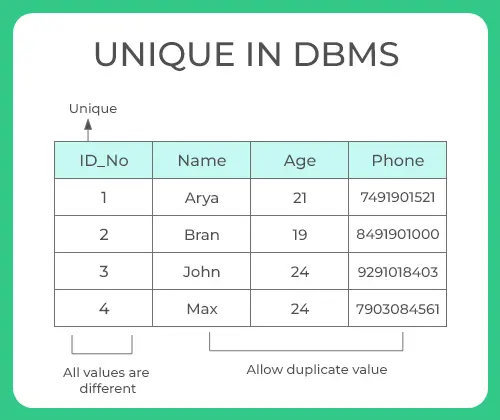0
Notifications Mark All Read
- Login
- Get Prime
Unique in DBMS
DBMS UNIQUE
On this page we will discuss about UNIQUE in DBMS. Unique constraint ensures that all values in a column are unique . It is an important concept of DBMS. So, lets just discuss it in detail.

UNIQUE IN DBMS
- Sometimes we need to maintain only unique data in the column of a database table, this is possible by using a
uniqueconstraint - Unique constraint ensures that all values in a column are unique
- If we unique constraint is applied to a column then all the values present the column must be unique i.e if you try to enter a duplicate data then will be shown an error
- A unique key can be applied to any number of columns in a table.

Syntax to create a unique constraint
CREATE TABLE table_name( column1 datatype(size) UNIQUE, column2 datatype(size) , column3 datatype(size) , );
Example
CREATE TABLE Persons ( ID int UNIQUE, LastName varchar(255) NOT NULL, FirstName varchar(255), Age int, );
In the above example, as we have used unique constraint on ID column we are not supposed to enter the data that is already present, simply no two ID values are same.
Combination of not null and unique
- You can use multiple constraints on a single column
- Whenever you apply both not null and unique constraints to a column it restricts to have only unique data values and also show it prevents null values at the same time.
Example
ID int NOT NULL UNIQUE
Primary key vs Unique key
- Both primary key and unique key will not allow duplicate values but the difference is that, the primary key will not accept null values where as unique key allows null values on the column
- Simply only one
unique + not null= primary key
| Primary Key | Unique Key |
|---|---|
| Identifies a record uniquely in a table | It helps to maintain unique data in the required columns of the table |
| It will not allow null values | It helps to maintain unique data in the required columns of the table |
| A clustered index is created | Non clustered indexes are created |
| Only one primary key is allowed in a table | A unique key can be applied to any number of columns in the table |
Prime Course Trailer
Related Banners
Get PrepInsta Prime & get Access to all 200+ courses offered by PrepInsta in One Subscription
Get over 200+ course One Subscription
Courses like AI/ML, Cloud Computing, Ethical Hacking, C, C++, Java, Python, DSA (All Languages), Competitive Coding (All Languages), TCS, Infosys, Wipro, Amazon, DBMS, SQL and others

 0
0



Login/Signup to comment